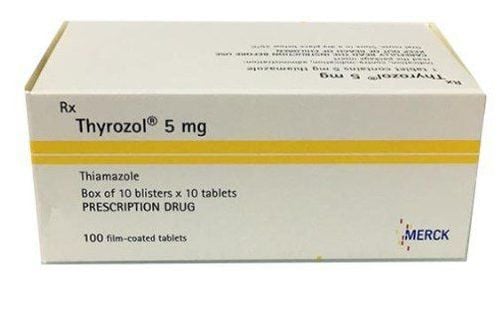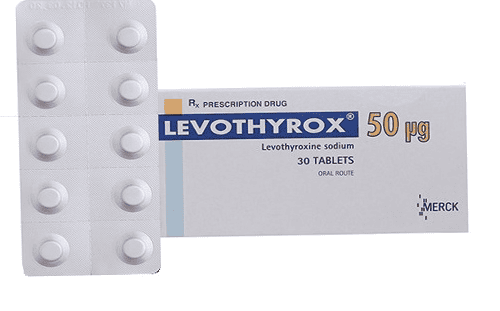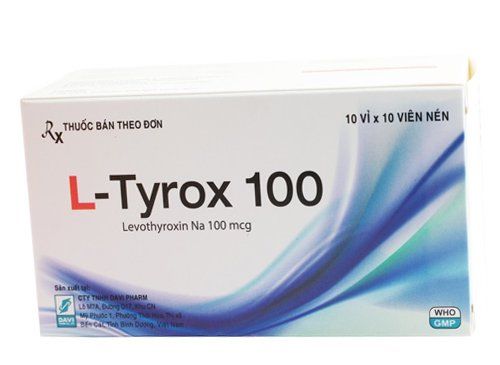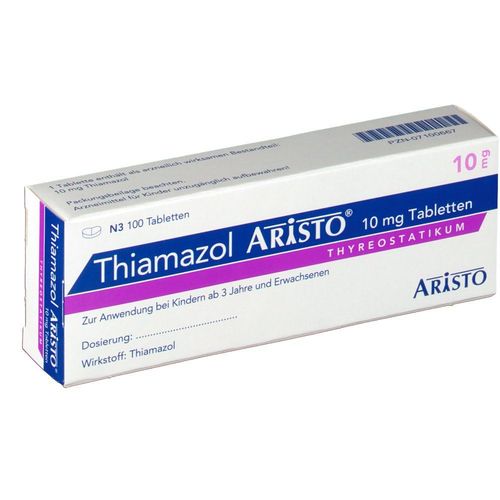This is an automatically translated article.
Disthyrox 100 is a hormone drug, used in the replacement or supplementary treatment of hypothyroidism syndromes of any etiology in all ages.1. What is Disthyrox 100?
Disthyrox 100 is a product of Ha Tay Pharmaceutical Joint Stock Company - Vietnam. The main ingredient is Levothyroxine sodium and excipients just enough for 1 tablet, accounting for 100mcg. Levothyroxine is an isomer of thyroxine, the main thyroid hormone. Levothyroxine sodium has the following effects:
Accelerate basal metabolism and metabolism of sugars, lipids and proteins; Increases the metabolic capacity of body tissues, thereby regulating cell growth and differentiation; Increased myocardial contractility; If this hormone is lacking, it will cause growth retardation, underdeveloped musculoskeletal system, causing ossification of the ends of bones. Mechanism: Regulates Thyrotropin (TSH) secretion.
Disthyrox 100 is in the form of tablets. A box of 5 blisters x 20 tablets.
2. Uses of the drug Disthyrox 100
The drug is indicated for the alternative or complementary treatment of hypothyroidism syndromes of any etiology in all ages; Helps inhibit thyrotropin secretion (TSH) in simple goiter and chronic thyroiditis; Used in combination with antithyroid drugs in thyrotoxicosis helps prevent goiter and hypothyroidism.
3. When to use Disthyrox 100?
Disthyrox 100 is used for the following cases:
Inhibition of TSH secretion: Treatment of goiter alone, reducing goiter size and chronic thyroiditis; Alternative or adjunctive treatment in hypothyroidism syndromes of all causes, except acute hypothyroidism during convalescence of subacute thyroiditis; Prevention of goiter and hypothyroidism in thyrotoxicosis in combination with other antithyroid drugs.
4. Contraindications to using Disthyrox 100
People who are sensitive to any of the ingredients of the drug; Untreated thyroid toxicity; Acute myocardial infarction ; Uncorrected adrenal insufficiency because it increases the demand for adrenal hormones in tissues and can cause acute adrenal insufficiency; Untreated thyroid toxicity.
5. Dosage and how to use Disthyrox 100
Initial dose and duration may vary from patient to patient based on age, presence of diseases, drug effects and blood levels of thyroid hormone. It may take 1-3 weeks after starting treatment with levothyroxine or changing the dose for the treatment's effects to be seen. Dosage to be used as directed by the doctor.
Dosage in children:
Alternative treatment for children < 1 year old: Take 25 - 50 mcg/time/day; Alternative treatment for children > 1 year: Oral 3-5 mcg/kg/day. Gradually increase the dose up to 150 mcg/day until the child reaches the teen years. Or can be used as follows:
Children from 0 - 6 months: 25 - 50mcg or 8 - 10mcg/kg/day; Children 6 - 12 months: 50 - 75mcg or 6 - 8mcg/kg/day; Children from 1 to 5 years old: 75 - 100mcg or 5 - 6mcg/kg/day; Children 6 - 12 years old: 100 - 150mcg or 4 - 5mcg/kg/day; Children over 12 years old: Over 150mcg or 2-3mcg/kg/day. Congenital hypothyroidism:
Full-term infants: Take 37.5mcg/time/day (from 25-50mcg). Premature babies, weighing less than 2kg, neonates or at risk of heart failure: Initially, take 25mcg/day, then gradually increase to 50mcg/day in 4-6 weeks. Dosage in adults:
Mild hypothyroidism: Initially: Take 50 mcg/time/day, then gradually increase the dose by 25-50 mcg over a period of 2 - 4 weeks until the desired response. People with cardiovascular disease: Initially take 25mcg/day or 50mcg every 2 days, then increase 25mcg every 4 weeks until the treatment results are achieved. Persons without cardiovascular disease: Oral 100-200mcg after clinical assessment. Severe hypothyroidism: Initially: Take 12.5 - 25 mcg / time / day. Increase daily by 25 mcg for 2-4 weeks until desired response is obtained. Maintenance: Take 75 - 125 mcg/day, once a day. Elderly hypothyroidism: Initial: 12.5 - 25 mcg/time/day. If the desired response is obtained within 3 to 4 weeks, an increase in dose may be considered. Maintenance: 100 - 200 mcg/day, may be higher depending on the patient. Patients unable to drink: Can be administered intravenously. Treatment of coma with myxedema: Initially: 400mcg intravenously on day 1 (from 200 - 500mcg), after 6-8 hours, there will be a response. Day 2 add 100 - 300mcg or more if desired effect has not been achieved. Maintenance: Intravenous 50-200mcg/day until the disease is stable or the patient can drink. Within 24 hours, Thyroxin levels return to normal. After 3 days, serum triiodothyronin increased 3 times. People with heart disease can get the injection at a lower dose.
6. Handling overdose or forgetting to use Disthyrox 100
If you forget to take a dose, take it as soon as possible. However, if it is almost time for your next dose, skip the missed dose and take your next dose at the scheduled time. Do not take twice the prescribed dose.
When using an overdose of Disthyrox 100 for a long time, it can cause the following symptoms:
Increased excretion, manifestations similar to endogenous toxicity such as appetite, palpitations, nausea, diarrhea, sweating, abdominal cramps, increased heart rate, increased blood pressure, arrhythmia, tremor, insomnia, menstrual disorders, fever, fear of heat, weight loss. How to handle drug overdose:
It is best when the patient shows unusual symptoms, the first thing is to stop using the drug and quickly take it to a medical center for timely handling; Treat symptomatically, induce vomiting, gastric lavage, give oxygen if there are no contraindications; Cholestyramine or activated charcoal can be used to reduce the absorption of Levothyroxine; use beta-adrenergic blockers such as Propranolol to prevent increased sympathetic activity; When there are no contraindications, intravenous Propranolol 1 - 3mg/10 minutes or oral 80 - 160mg/day; If congestive heart failure occurs, use cardiac glycosides; Take control measures, hypoglycaemia, dehydration if necessary; Use Glucocorticoids to inhibit metabolism from T4 to T3.
7. Side effects when using Dithyrox 100
Unintended side effects caused by taking Disthyrox 100 are quite rare, but some of the following symptoms can still occur:
Common symptoms: Sweating, tachycardia, arrhythmia, angina , palpitations, nervousness, excitability, tremor, headache, insomnia, heat intolerance, fever, weight loss, diarrhea, abdominal cramps. Uncommon: alopecia. Rare: Hypermetabolism, heart failure, osteoporosis, allergies, early healing of the skull joint in children, pseudotumor in the brain in children. Inform your doctor of any side effects when taking the medicine.
8. Other notes when using the drug and how to store it
Pregnant women: Thyroid hormone does not cross the placental barrier. To date, no adverse effects on the fetus have been found when the pregnant mother is taking thyroid hormone. Because during pregnancy, women with hypothyroidism have an increased need for Levothyroxine, so it is still used. However, it is necessary to periodically check the serum TSH concentration to adjust the dose; Nursing Mothers: Levothyroxine sodium is excreted in small amounts in breast milk, but it is unlikely to cause harm or tumors in infants. Use caution. Consult a doctor before use; People who drive and operate machines: Does not affect the ability to drive and use machines; Use with caution in people with cardiovascular disease and hypertension; Reduce dose when chest pain occurs; Disease symptoms may be aggravated when used in people with diabetes or diabetes insipidus or adrenal insufficiency; Check Prothrombin levels regularly to adjust the dose of Disthyrox 100 accordingly; Store the medicine in a cool, dry place, away from moisture and direct sunlight. In summary, Disthyrox 100 is an alternative or complementary treatment for hypothyroidism syndromes of any etiology in all age groups. Using the drug according to the instructions and instructions of the doctor will help improve the effectiveness of the treatment and avoid unwanted side effects.
Please dial HOTLINE for more information or register for an appointment HERE. Download MyVinmec app to make appointments faster and to manage your bookings easily.













